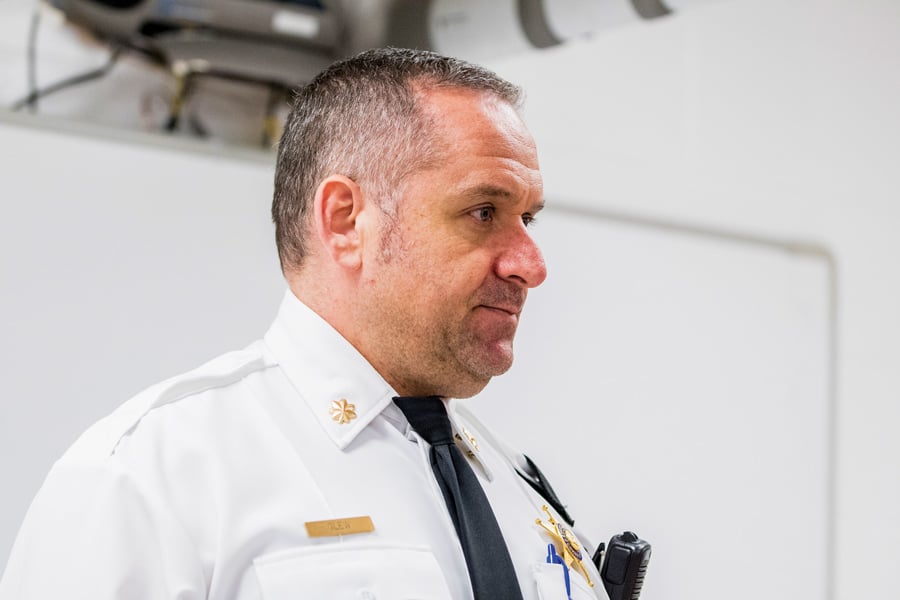Citizens’ Network of Protection talks police body camera program
Daily file photo by Colin Boyle
Evanston police Cmdr. Ryan Glew. Glew spoke Tuesday at a Citizens’ Network of Protection event on police body-worn cameras.
May 20, 2021
Evanston police Cmdr. Ryan Glew discussed state and local policies on police body cameras at a Tuesday event hosted by Citizens’ Network of Protection.
Evanston Police Department’s body-worn camera program was fully implemented in 2018 after a pilot period in 2017, Glew said. 120 Axon body cameras were deployed to the field units in patrol, traffic, problem solving team and the special operations group, according to EPD’s website.
In January 2019, EPD expanded the program to include members of the detective bureau, juvenile bureau and school resource officers, according to the website.
State law requires officers to activate their camera when engaging in any law enforcement-related activity, with limited exceptions. Additionally, Glew said EPD requires officers to verbally tell people they are being recorded, which is beyond what Illinois law requires.
“If they want to say that they don’t want to (be recorded), if it’s allowed by law, then we won’t record,” Glew said. “Some people, depending on the circumstances, can’t withdraw their consent.”
According to the Illinois Law Enforcement Officer Worn Body Camera Act, an officer may continue recording despite a request to stop if they have reasonable suspicion that the person has committed or is committing a crime. The officer must indicate on the recording their reason for continuing to record.
CNP president Betty Ester asked Glew about a person’s right to inquire about whether an officer’s body camera is recording and ask that they turn it on if it’s not. Glew said when a body-worn camera is recording, a light on top of the camera will blink red and it will periodically emit a tone. When a body-worn camera is turned on, the previous 30 seconds will also be recorded.
Ester told the Daily CNP isn’t aware of any cases in Evanston where an officer failed to turn on a camera when required by law.
Glew said the law requires that bodycam footage be retained for 90 days except under certain circumstances, including situations involving use of force, death or grave bodily injury. If an involved officer is being investigated for misconduct, or if there was a detention or arrest, footage must also be retained beyond the 90 days, he said.
Glew also expanded on EPD’s complaint intake process, saying the department will accept complaints up to two years after an incident.
When investigating complaints, Glew said bodycam footage is important because it provides context and tones that aren’t captured in officers’ reports. In cases of anonymous complaints, he said bodycam footage is essential as the camera “basically becomes a witness.”
At an April meeting, the Citizen Police Review Commission, a Human Services subcommittee that reviews EPD’s internal investigations, concluded that an investigation into an allegation of race-based preferential treatment by an EPD officer was insufficient for the second time and returned the case to EPD for further review. One of the reasons was because EPD had not reviewed the bodycam footage from the other officers at the scene.
CPRC member Karen Courtright asked Glew about the discrepancy between the 90-day limit for keeping bodycam footage and the two-year limit for filing a police misconduct complaint. Glew said current technological limits make it cost-prohibitive to store all bodycam footage for more than 90 days, but this could result in the footage being deleted by the time a complaint is filed.
If a person thinks they might want to file a complaint in the future, Glew said they can call EPD, who will flag the footage so it won’t be deleted.
Ester told the Daily CNP would like to see the law changed to make police departments retain footage for longer. Additionally, she said it’s important for residents to be aware of police body camera policies — a key reason CNP held the event.
“Our goal (in holding the event was) to educate the public, to make the public aware of the different (bodycam) procedures, techniques and things that (the police) use,” Ester said.
Email: [email protected]
Twitter: @cvanwaasbergen
Related Stories:
— Evanston residents discussed alternatives to policing in CNP meeting
— Citizens Protection Network discusses Review Commission, Snapchat incident and COVID-19 regulations
— Citizens Network of Protection discusses possible police oversight methods


